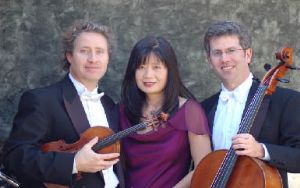|
Symphony
SRS SEASON ENDS WITH RESOUNDING TA-TA-TA-BANG
by Terry McNeill
Sunday, June 1, 2025
Symphony
YOUTHFUL VIRTUOSITY ON DISPLAY AT USO'S MAY CONCERTS
by Peter Lert
Saturday, May 17, 2025
Symphony
MYSTICAL PLANETS AND LIVELY GERSHWIN ORTIZ AT FINAL SRS CONCERT
by Peter Lert
Sunday, May 4, 2025
Symphony
VSO'S CONCERT MUSIC OF TIME, MUSIC OF PLACE
by Peter Lert
Sunday, April 27, 2025
Choral and Vocal
VOCAL ELEGANCE AND FIRE AT THE 222'S RECITAL APRIL 26
by Pamela Hicks Gailey
Saturday, April 26, 2025
CANTIAMO SONOMA SINGS AN INSPIRED GOOD FRIDAY MOZART REQUIEM CONCERT
by Pamela Hicks Gailey
Friday, April 18, 2025
DRAMATIC SHOSTAKOVICH SYMPHONY CLOSES PHILHARMONIC'S 25TH SEASON
by Terry McNeill
Sunday, April 13, 2025
LARGE COLLEGE OF MARIN AUDIENCE GREETS STOPHER ARTISTRY
by Terry McNeill
Saturday, April 5, 2025
Chamber
FRISSON DELIVERS SHIVERS OF DELIGHT
by Abby Wasserman
Sunday, March 30, 2025
OLD AND MOSTLY NEW IN SRS MARCH CONCERT IN WEILL
by Peter Lert
Saturday, March 22, 2025
|
 |
 TILDEN PIANO TRIO |
TILDEN TRIO IN TOP FORM AT OAKMONT
by Terry McNeill
Thursday, July 10, 2008
Classical music in the North Bay has lately been blessed by a number of piano trio concerts, including Roy Bogas’ Trio (Gualala Arts Center), Eric Zivian’s Trio (Occidental Chamber Series), the Sequoia Trio from SRJC and of course the preeminent Trio Navarro from Sonoma State. The Tilden Trio, the newest kids on the block, made an auspicious entrance July 10 at Oakmont and quickly demonstrated they belong at the top of their profession.
Formed in 2004 by former Juilliard classmates, the Tilden began their concert on a hot day before 140 mostly Oakmont residents with an appropriately warm reading of the Allegretto in B-Flat of Beethoven, WoO 39. There are touches of the “Spring” Violin Sonata here, and it was an auspicious opening, almost bucolic. The instrumental blend was smooth and remained so throughout the afternoon.
Violinist Sarn Oliver introduced the second work, a piece he wrote while living in the Berkeley hills, aptly titled “Tilden Park.” Composed in 2005, the piece continued the ambiance of the Beethoven, both in the gracious unfolding of short themes and in sticking to tonality. Oliver’s violin was often in a high register, though insistent chord projections by pianist June Choi Oh moved things along when needed. There was no hurry to get anywhere with the piece, built in sections rather than movements. There are hints of Barber in “Tilden Park,” all to the good, and it received an idiomatic interpretation. Cellist Peter Wyrick was outstanding. He’s not a flamboyant instrumentalist, but he produces a perfectly poised stream of sound, rich and warm; there isn’t a dry note in his bow. As the associate principal cellist of the San Francisco Symphony, he’s a local treasure, and it would be a treat to hear him in recital.
The first half ended with the popular Ravel Trio in A Minor, written at the outset of the First World War, when the composer resided in the French Basque commune of Saint Jean de Luz. The percentage of masterpieces from Ravel’s pen is abnormally high, and the piano trio is no exception. It is an orchestral work, with rich textures and lots of coloristic effects. The first movement featured Wyrick’s expressive rubati and Oliver’s high violin line, with a wide vibrato. Much of the thematic material was reminiscent of Ravel’s “Mother Goose Suite.” The movement received an elegant reading and a lovely, long ending fermata.
The Pantoum movement has tricky pizzicatos and an oriental thematic cast, and Choi Oh seemed to want a subdued sound throughout, perhaps too much so. The subdued tones continued into the Passacaile, a dignified movement with lush cello work, almost a threnody. The Tilden then jumped into the finale (Anime) with just the right blend of instrumental sparkle, especially the long trills from Oliver. The many ascending scales in the piano part could have been more distinct, but perhaps were of a piece of Choi Oh’s supportive and unassertive pianism.
Following intermission, the Tilden played the D Minor Trio by the 19th century Russian composer Anton Arensky. It’s been a long time since I’ve heard a live performance of this favorite work—all the way back to Pennario, Heifetz and Piatigorsky in Los Angeles. Performers usually opt for either a smooth and fast approach (Beaux Arts Trio) or an old-fashioned, voice-leading Russian style (Borodin Trio). Happily, the Tilden opted for mostly the second rhetoric, playing the long first movement with a rich blending of the instruments, albeit with fleeting pitch problems from the violin. There is some Dvorak in this movement, more so in the ensemble rather than in the noble opening theme. Wonderful.
The Scherzo found Choi Oh providing the structure for a movement that does need clarity. The Elegia (Adagio) was sung in opulent colors by Wyrick, mostly pianissimo. In the concluding Allegro non troppo, a theme from the first movement suddenly reappears, cementing the cyclical nature inherent in much of the work. The Tilden was of one mind in this movement, and it was convincing. A student of Rimsky-Korsakov, Arensky was acknowledged to be under the influence of Tchaikovsky and Rubinstein. Rimsky-Korsakov thought his student would soon be forgotten, but the D Minor Trio, in the hands of the Tilden, belies his prediction.
A single encore was offered: Piazzola’s tango “Oblivion.” Surprisingly, this luxuriant piece has had previous Oakmont hearings, once as a chamber work and once as a piano solo. The audience, after the exuberance of the Arensky, was justifiably entranced.
The Tilden is a polished trio with a glowing, cohesive sound. With this one concert, it has vaulted into the front rank of chamber music groups appearing in the North Bay.
|

